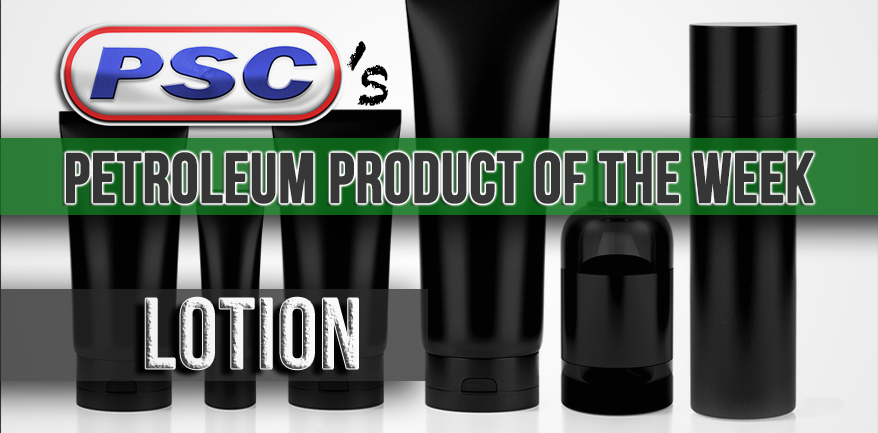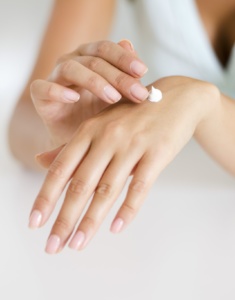Petroleum Product of the Week: Lotion
By on Mar 09 2018

When the air is cold and dry, you're probably going through buckets of this stuff. But what exactly is in the lotion that makes our hands and legs and feet feel so soft and supple?
It's all about that moisturizer, baby.
Lotions are low-viscosity topicals that are actually far more useful than you might think. While people primarily use lotions to smooth, moisturize, and soften the skin, they sometimes use them to deliver medicine. Lotions can be used to apply antibiotics, antiseptics, antifungals, corticosteroids, and anti-acne agents. Health care workers also use hospital-grade lotions to help prevent skin dermatitis caused by frequent exposure to cleaning agents in soap. Lotions are different from creams, ointments, and gels in viscosity.
Moisturizer
If you're not using a lotion to help soothe a medical condition or block UV rays, you're probably using it to moisturize your skin. Or to smell better, since fragrance is common in lotion.

Dry, cracked skin has a scientific name: transepidermal water loss (TEWL). Water seeps out of your body through the different layers of skin. Your skin gets dry when its moisture level is less than 10%.
There are three layers to human skin (aka the body's largest organ): the outer layer (epidermis), the middle layer (dermis), and the lower layer (hypodermis or fatty layer). Blood cells deliver moisture to the middle layer of the skin. Moisture then travels through to the epidermis before it evaporates into the atmosphere. This evaporation is what causes dry, flaky, scaly " skin.
Moisturizing lotions either hold water in the outermost layer of the epidermis or restore moisture that's already been lost.
Occlusives are moisturizers that create a barrier over the skin and stop evaporation by trapping water. These waxes, oils, and silicones (like petroleum jelly) are incredibly effective but they can be sticky and messy because they're not absorbed. Emollients, on the other hand, actually permeate the skin and make it feel so soft and flexible. Humectants are another type of moisturizer that actually attracts moisture to the skin and keep it there. These are essentially the opposite of occlusive and emollients.
What's in your bottle?
Moisturizing lotions come in a wide variety of formulations meant to effectively treat varying skin types. People with normal skin likely only need a light moisturizer with natural oils. Comparatively, those with very dry skin might need a heavier lotion with humectants. Individuals with oily skin will likely want a water-based lotion to minimize greasiness. For acne-prone skin, non-comedogenic lotions are best.
When looking at the ingredients that might be in your bottle of lotion, these can be divided into three categories: humectants and emollients (as mentioned above) and preservatives. Humectants, which help absorb moisture, include urea, glycerin, and alpha hydroxy acids. Emollients, which lubricate and smooth the skin by filling in spaces between skin cells include lanolin (a wax secreted by wool-bearing animals), mineral oil, and petrolatum (both derived from petroleum). The preservatives prevent bacteria growth in moisturizers. Lotions may also contain additional ingredients such as vitamins, minerals, plant extracts, dyes, and fragrances.
Moisturizers with petrolatum are best for people with mature " skin or very dry and cracked skin, according to the Mayo Clinic. You should not use very heavy lotions and creams on your face unless your skin is excessively dry.
If you want to avoid lotions with animal products, such as animal fat, lanolin, beeswax, and milk protein, look for vegan skincare products. These use synthetic moisturizers or vegetable glycerin to moisturize.
While not all lotions contain petroleum-based petrolatum or mineral oil in their formulation, they are often packaged in plastic bottles, tubes, and tubs so recycle accordingly!
Sources:
http://www.businessinsider.com/how-do-moisturizers-work-to-keep-your-skin-soft-and-smooth-2015-7
https://health.howstuffworks.com/skin-care/moisturizing/products/skin-moisturizers.htm
https://www.mayoclinic.org/diseases-conditions/dry-skin/in-depth/moisturizers/art-20044232?pg=1
https://en.wikipedia.org/wiki/Lotion






